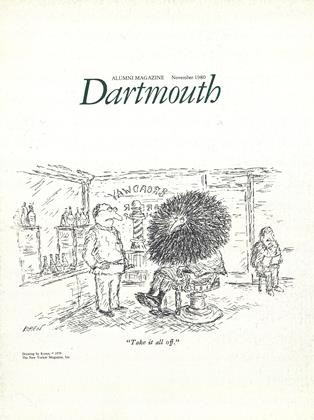Charles Wilder '44, Another Side of the Blues. Exposition, 1980. Softcover. 123 pp. A collection of seven short stories which explore the "tragicomedy of racial interaction and inner conflict." Happily, for the most part Wilder does not confuse theme with art; his stories are not just social documents masquerading as fiction. They are fiction, and well-managed fiction, too. The protagonists, both black and white, are three-dimensional human beings; the situations in which they are placed are, in terms of today's polarized society, fully imagined; their actions are credible. If the reader's response to the stories seems sometimes more socially than artistically oriented anger at racism, at economic deprivation of blacks, at white complacency the stories also engender reactions more appropriate to the domain of fiction than of society. They are, by turns, comic, tragic, ironic. Above all, ironic.
Peggy and Alan Bialoski '54, Teddy Bears:Pictures and Price Guidelines. Ontario Printers, 1980. Softcover. 111 pp. No, it's not a book of nursery stories. The subtitle identifies it: It's a handbook for collectors of Teddy bears! The collecting fraternity is apparently both sizeable and organized, and indeed the authors write that "Teddy bears have become extremely collectible, and prices are rising." As the Bialoskis describe it in their letter of transmittal to us, Teddy-bear collecting sounds appealing: "The Teddy bear is no ordinary toy; it is a unisex companion, a mascot, a touchstone, and a panacea cure for a rocky stock market, a turbulent world, a high-pressure career. Sort of a fur-covered double martini with shoe-button eyes instead of olives." Well, de gustibus ....
Richard A. Lyczak '67. ElementaryProgramming for Statistics. Duxbury Press, 1980. 197 pp. A textbook for courses in computer programming specifically aimed at three kinds of audiences: "(1) the undergraduate, or beginning graduate student, in any discipline or program of study, who needs to use the computer for statistical analysis; (2) the user of either FORTRAN or BASIC who wants to learn the other of the two languages; and (3) the professional who would like a catalog of statistical programs to use when statistical packages are unavailable or incomplete." Lyczak's straightforward acknowledgment underscores the considerable role of the College in stimulating student interest in computers during recent years: "Institutional credit for this work must go to Dartmouth College, for it was at Dartmouth that my interest in computers was kindled and nurtured," Lyczak is on the staff of the RMC Research Corporation.
Kenneth Winchester and David Dunbar '75. Walking Tours of New England. Doubleday, 1980. 448 pp. Illustrated. This book really is for walkers as opposed to hikers and backpackers. The subtitle explains: "A Footloose Guide to Historic Mansions and Museums, Village Ghosts and Greens, and Yankee Doers and Dreamers." Book in hand, you can walk leisurely and better, knowledgeably through 40 New England cities, towns, and villages, explore such urban centers as New Haven, Providence, and Boston or, if a rural stroll is more to your taste, such villages as Woodstock, Vermont, or Hallowell, Maine (and, for that matter, Hanover, New Hampshire). There are 52 detailed maps, one each for the 40 walks plus state and regional maps; a text describing each walk in ample detail; over 200 photographs and drawings to suggest what you might want to look for: the book gets you efficiently from point to point. And along the way it enlightens you on such relevant regional subjects as the art of scrimshaw, exorcising vampires, New England architecture, antique collecting, and how to tell a quahog from a cherrystone. Whichever way you take your walk, a literal one on a summer's day or an imagined one from a winter's armchair, the book is equally useful. And it disproves that ancient New England story: you can get there from here. Winchester and Dunbar show you how.
Clayton Roberts and David Roberts, professor of history. A History of England. Prentice-Hall, 1980. 2 vols. A new history of England "broad in scope and interpretive in nature" which emphasizes social rather than purely political history. Such an approach was required, the authors explain, because in the vast amount of scholarship on the subject that has appeared during the past 20 years "demographers, intellectual historians, social historians, historians of technology, and historians of popular movements have opened up a new world, a world which general histories of England have previously ignored." Combining a narrative form with their "concern for interpretation," the authors "have sought to illuminate this broader, richer world, even though it means saying less about the rise and fall of ministries." Though designed to serve as a college-level text, the book will also attract significant numbers of general readers. After all, as the Robertses remark, "a people that gave us Shakespeare and Newton, created the Common law and Parliament, built the world's largest empire, transformed industry, and defended the liberties of Europe against Napoleon and Hitler cannot be dull or insignificant."
 View Full Issue
View Full Issue
More From This Issue
-
 Feature
FeatureHAIR
November 1980 By Dan Nelson -
 Feature
FeatureNow Let Him Praise Emmets
November 1980 By Robert Sullivan -
 Feature
FeaturePostmark: Bucharest
November 1980 By Douglas Reichert -
 Article
ArticleTrusteeship and the Alumni
November 1980 -
 Article
ArticleUnofficial Arbiter
November 1980 By Patricia Berry '81 -
 Article
ArticleWanted: Road-trip Messerly
November 1980 By Parker B. Smith '66
Article
-
 Article
ArticleAlumni Recorder Creates A Change in '26 Records And in Our Masthead
March 1956 -
 Article
ArticleWomen's center on
June 1987 -
 Article
ArticleTHAYER SOCIETY OF ENGINEERS
APRIL, 1927 By F. H. MUNKELT -
 Article
ArticleBruce Nichols: One Chance to Bring it all Together
FEBRUARY • 1988 By Harry Zlokower '63 -
 Article
ArticleUNDERGRADUATE CHAIR
February 1933 By J. S. M. '33 -
 Article
ArticleStephen W. Bosworth '61: Public servant in the spotlight
JUNE • 1986 By Robert H. Conn '61

